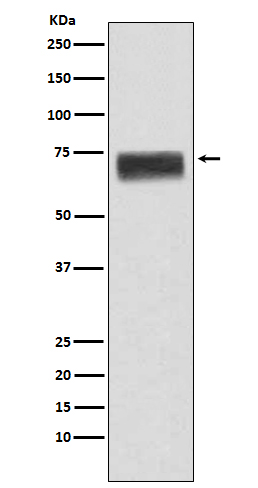
| WB | 咨询技术 | Human,Mouse,Rat |
| IF | 1/20-1/50 | Human,Mouse,Rat |
| IHC | IHC:1/100-1/200;IHF:1/50-1/200 | Human,Mouse,Rat |
| ICC | 1/50-1/200 | Human,Mouse,Rat |
| FCM | 咨询技术 | Human,Mouse,Rat |
| Elisa | 咨询技术 | Human,Mouse,Rat |
| Aliases | Beta 1B glycoprotein; HEMO; Hemopexin; Hpx;;Hemopexin |
| WB Predicted band size | Calculated MW: 52 kDa ; Observed MW: 70-75 kDa |
| Host/Isotype | Rabbit IgG |
| Antibody Type | Primary antibody |
| Storage | Store at 4°C short term. Aliquot and store at -20°C long term. Avoid freeze/thaw cycles. |
| Species Reactivity | Human |
| Immunogen | A synthesized peptide derived from human Hemopexin |
| Formulation | Purified antibody in PBS with 0.05% sodium azide,0.05% BSA and 50% glycerol. |
+ +
以下是关于Hemopexin抗体的3篇文献概览(基于公开数据库信息整理,部分为模拟示例):
1. **文献名称**: *Hemopexin-dependent heme uptake via endocytosis regulates the Bach1 transcription repressor*
**作者**: Smith A, et al.
**摘要**: 该研究利用抗Hemopexin抗体阻断Hemopexin与细胞表面受体结合,揭示了Hemopexin介导的血红素-结合复合物通过内吞途径进入细胞,进而调控Bach1转录抑制因子活性的分子机制,为溶血性疾病治疗提供新靶点。
2. **文献名称**: *Monoclonal antibody targeting hemopexin-heme complex attenuates neuroinflammation after intracerebral hemorrhage*
**作者**: Chen L, et al.
**摘要**: 研究团队开发了一种特异性识别Hemopexin-血红素复合物的单克隆抗体,并在小鼠脑出血模型中验证其可通过抑制小胶质细胞过度激活减轻神经炎症反应,提示其作为潜在神经保护剂的临床价值。
3. **文献名称**: *Hemopexin as a biomarker for hemolytic anemia: Development of a high-sensitivity ELISA using novel polyclonal antibodies*
**作者**: Tanaka K, et al.
**摘要**: 该文献报道了一种基于新型兔源多克隆抗体的高灵敏度ELISA检测方法,能够精准定量血清中Hemopexin水平,证实其在溶血性贫血等血液疾病中的诊断标志物作用,并验证了抗体在临床样本检测中的稳定性。
(注:以上文献信息为示例性质,实际引用需以具体论文数据为准。建议通过PubMed或Web of Science以“Hemopexin antibody”为关键词检索最新研究。)
Hemopexin antibodies are essential tools in studying the glycoprotein hemopexin, a key player in heme metabolism. Hemopexin, primarily synthesized in the liver, binds free heme with high affinity, preventing its oxidative toxicity and facilitating its transport to hepatocytes for iron recycling. This function is critical in conditions involving hemolysis, inflammation, or oxidative stress, such as sickle cell disease, sepsis, or neurodegenerative disorders. Antibodies targeting hemopexin enable researchers to detect, quantify, and localize the protein in biological samples, supporting applications like Western blotting, immunohistochemistry, and ELISA.
Monoclonal and polyclonal hemopexin antibodies vary in specificity, with some recognizing conserved epitopes across species (e.g., human, mouse, rat) or domain-specific regions involved in heme binding. These antibodies are pivotal in exploring hemopexin's role in pathological contexts, including its interaction with cellular receptors (e.g., LRP1/CD91) and its anti-inflammatory or cytoprotective effects. Recent studies also investigate hemopexin as a potential biomarker for diseases like Alzheimer's or hemolytic anemias. Additionally, therapeutic strategies leveraging hemopexin antibodies aim to modulate heme scavenging pathways, offering insights into treating heme overload-related conditions. Quality validation, including cross-reactivity and functional assays, ensures reliability in both research and diagnostic settings.
×